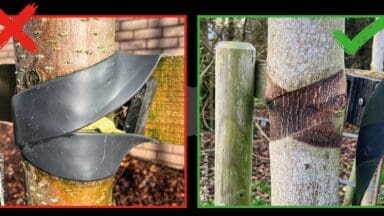
To ensure newly planted trees don’t blow over or endure wind damage, they are supported by stakes and tree-ties, to hold the root system firm in the ground. Over time, when the roots grow into the surrounding soil, the tree is able to bear its own weight and withstand the elements, after which stakes and tree-ties are to removed typically 3-5 years after planting.
If these are left, the ties can strangle the trees, which could fail to establish, or even die. The pressure of a tree-tie can constrict the growth of the trunk, causing damage to the bark and the living/conductive tissue underneath (phloem, cambium & xylem). This restricts the flow of resources that the tree needs to survive (water, nutrients and carbohydrates). Through a lack of good aftercare or a lack of understanding, these trees will struggle to establish in the landscape, with many dying as a result.
On a national level, this represents a huge waste of (natural) capital for the country as the trees don’t achieve the landscape and ecosystem benefits for which they were planted. In addition, there are industry losses to consider as the arboricultural and landscape profession it costs on average £350 to supply and plant a (12-14 cm girth) tree.
Fund4Trees, the charity promoting sustainable treescapes and the Arboriculture Association point out that theatre could be tens of thousands of these strangled-on-stake trees across the UK – probably many more in multiple locations from local parks, business and public/private housing estates to large retail car parks and private front gardens.
With their new “Free the tree” campaign, it is hoped to raise awareness amongst the public of the dangers of restricting tree-ties and encourage action is taken when needed.
John Parker, CEO of the Arboricultural Association said: “As an industry we’re encouraging people to realise that planting a tree is just one small part of the story. Arboriculturists work in tree time, not human lifespans or political cycles. After planting there are a few years of young tree maintenance, including watering, and then for decades or centuries to come the healthy survival of the tree is dependent on inspections, pruning, management and protection.”
Russell Ball, Founder and Trustee of Fund4Trees added: “This is an important national public-engagement campaign to mobilise efforts within local communities to find these abandoned on-stake trees and help save them from their strangling ties.”

